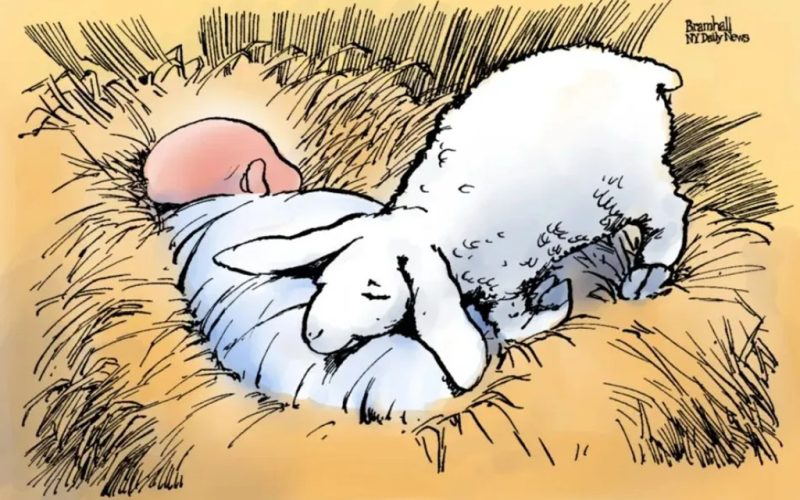It was cold in the stable that night, and the animals were huddled together for warmth. The cows and the oxen and the donkeys. And one little lamb.
Sad, scrawny little lamb, born lame and frail. Too frail to be out with the flock in the fields. The shepherds had carried it into the stable, where it would be safe from the wind and the wolves, for both the wolves and the wind came down from the hills with a fierceness in the wintertime.
The lamb had food and shelter, but that was not enough. It was lonely. Separated from its mother, it felt unloved. The other animals tried to be kind, but they had no time. During the day, they were busy working: The cows had milk to make, the oxen had earth to plow, and the donkeys had carts to pull.
At night, they were all very tired. They’d feed upon the fodder, and then go right to bed. None would talk, none would play. None would even sing a lullaby to a lamb that needed comfort. Every night the lamb would cry, and be told to hush, for its bleats disturbed their sleep.
Thus, that night, the lamb cried without making a sound, as it had learned to do. And it looked at the strangers who were sharing the stable. At the man, who held the woman’s hand and spoke to her so softly. And especially at the woman, who spoke not at all.
Huddled together, the animals slept, and eventually the lamb slept, too. And the night was silent.
But then, in the darkest hour, there was no more darkness and no more silence. There was the cry of a baby. And the stable shone with the brightest of lights and there were voices ringing in the air.
The animals, shaken from their dreams, were frightened. They stamped their hooves and tossed their heads and made their frightened-animal noises, but the light was so lovely and the voices so beautiful, it wasn’t long before they quieted and began to lose their fear.
And when the light had dimmed to a glow and the voices were only an echo, there in their manger, they saw the baby, and their eyes went wide with wonder. The animals murmured but would not approach until the woman beckoned. Then, one by one, the beasts came forward. All, that is, except the lamb, which was only a baby itself and still terribly afraid. Forgotten by the others, it trembled in a corner and tried to hide beneath the hay.
But the baby in the manger was trembling, too. The cold of the night had returned, and the baby had started to shiver. When the animals saw this, they huddled closer about the crib.
The man took off his cloak and made a blanket of it, but the cloak was thin and threadbare and provided little warmth.
The woman held the baby to her breast. He shivered still, and she began to weep.
And the lamb, which knew what weeping meant, lifted itself from the hay. Though it was still afraid, it left its hiding place. It made its way among the legs of the bigger beasts, until it stood beside the woman, and it laid its head against her knee.
And the softest of hands reached down and stroked its wool.
And the gentlest of hands picked it up and tucked it into the manger straw, and tucked the baby in beside it, and covered them both with the cloak. The baby snuggled near, and smiled, and closed his eyes.
And the lamb was very glad it had learned to cry without making a sound. Because it was crying now and didn’t want to wake the child.
But the lamb wasn’t crying because it was sad. It was crying because, at last, it didn’t feel alone. Or afraid. Or unloved.
Then the lamb closed its eyes, too. And the woman sang a lullaby.
Zautyk, a former member of the Daily News Editorial Board, wrote this for her father, John.








